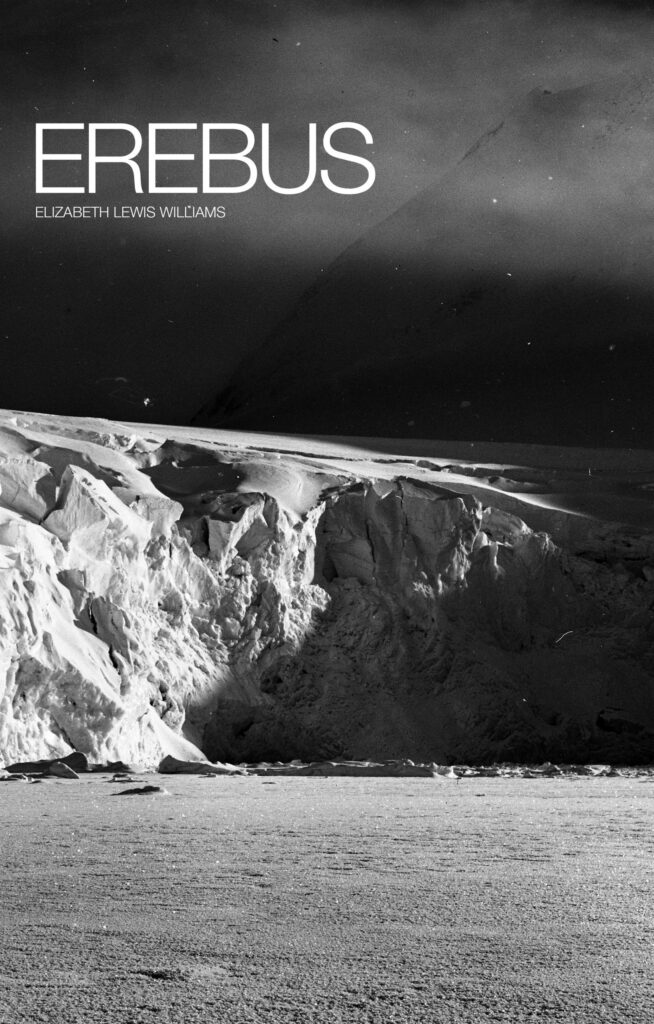
In 1958, geophysicist A. G. Lewis travelled to the Antarctic to investigate the landscapes and skies of that vast and icy continent. Now Elizabeth Lewis Williams traces her father’s journeys, from the Peninsula to Mt Erebus. They are real, imagined, and artistic journeys, exploring communication across time and space, and experiments in scientific and poetic measure. Erebus transports us to an Antarctic of paradox. A land where perpetual daylight balances months of austral darkness. A land of encounters with the unknown, and with mortality – but where camaraderie and faith are the only defence against catastrophe. At its heart, Erebus is a visit to the frozen underworld, and an exploration of how we find a place for ourselves in this vast and often unforgiving world we call home.
Erebus by Elizabeth Lewis Williams paints a complex picture of a continent hidden to the
majority of the world. Williams contrasts the awe-inspiring beauty of Antarctica with its testing
nature which enriches the reader far beyond any pre-conceived notions. Williams’ personal
connection to the narrative adds a sense of genuineness that emboldens the poetry and forces the
reader to contend with writing based firmly in reality.
Williams’ presents an obsidian world that restlessly exists to the far south of our world whilst
highlighting striking images that only serve to affirm the Author’s powerful language.
The sea’s restlessness stilled
by the pack in the bay,
its surface temperature
drops and frazil ice like
needles in suspension
crystallises the dark. (6)
Williams depicts the hoary embrace of the Antarctic through its power and a roughness that can be seen threaded throughout this collection. This juxtaposition between otherworldly beauty and harsh weather enlivens the reader and ensures that a delicate duality remains long after this collection has been read. Such enchanting imagery emboldens the narrative and accentuates the already stark, raw beauty of the Antarctic. Williams’ goes to great length to ensure that the continent is portrayed in all its finery for aquatic life teeming in the great frigidity of the ocean’s depths to falling snow in land.
Silence closes round the space you leave
but in the sea below, unheard,
a teeming of krill,
the flutings of seals,
the flick and darting of fish
through slow spun tendrils
of whale song. (9)
Williams interweaves an emotive and powerful isolation that ensures the reader feels and breathes the all-encompassing sentiment so expertly depicted by Williams. Further, Williams’ literary prowess must be applauded here as I felt totally enclosed in a hoary world of magnificent splendor harsh but intriguing all the same.
The sun has not risen
for 90 days, and the snow
is falling outside the hut.
I cannot take you in my arms,
or press the skin above your heart
with my ear. My love,
you are wholly invisible,
even your scent has vanished
under fathoms of ice. (60)
As a whole, Erebus is a collection of poetry that encapsulates what it must be like to reside in Antarctica. Without having the privilege of visiting this southern continent, I can truly say that Williams has awakened a sense of wonder and amazement and perhaps even, a minute amount of fear of the unknown amidst the beguiling milky white of this arcane land mass. Erebus is a pleasure and privilege to have read and I sincerely encourage you to take the time to savor Williams’ splendid words!
Anthony Salandy is a Black Mixed-race poet & writer whose work has been published widely. Anthony has 3 published chapbooks as well as a novel. Anthony is the EIC of Fahmidan Journal. He is also the Review Editor at Full House Literary & Poetry Editor at Chestnut Review.
Twitter/Instagram: @arsalandy https://arsalandywriter.com/
